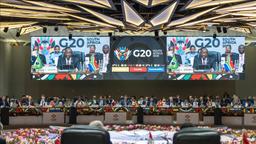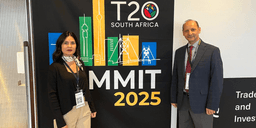
In a roundtable meeting organized by TEPAV Hausmann delivered a speech with the title 'Turkey's Growth and Regional Development'.
ISTANBUL -Prof. Ricardo Hausmann, Director of Harvard University Center for International Development, stated that the development of average consumption patterns in the world is similar to Turkey's export pattern and made some recommendations for Turkey to seize this opportunity.
Delivering a speech at the roundtable meeting titled 'Turkey's Growth and Regional Development' organized by TEPAV on 8 December 2010, Hausmann underlined that Turkey should rapidly diversify the production and export goods and said: "The way to development is not to remove non-sophisticated products from production and export basket but to add new products to the basket." Hausmann stated that Eastern provinces in particular need immediate steps in this direction and stressed the importance for development potential of these provinces of exporting goods - even if less sophisticated - to Middle Eastern and Asian markets. Drawing attention to the relation between sophisticated products and level of income, Hausmann also underlined that putting the skill improvements required for the production of sophisticated products should be at the heart of industrial policy framework.
Public-private dialogue channel must be expanded
Stating that the diversification and sophistication of the product basket should be considered on the basis of provinces as well as at domestic level, Hausmann attracted attention to the need for the public sector to expand the channel of dialogue with the private sector. Hausmann went on to say that in the US private sector can voice its needs more efficiently through representatives or lobbying groups in the Congress whereas Turkey faces some constraints in this respect. Hausmann argued that assuring progress in this respect should be a priority for Turkey.
Hausmann also called Turkey to focus on India rather than China as a potential trade partner. Maintaining that a closer analysis of Turkey's exports to China reveals that the two countries are not natural trade partners, Hausmann said that China's imports from Turkey are composed predominantly of raw materials. Hausmann underlined that India's import structure is in line with Turkey's export pattern due to which focus on Indian market could prove fruitful for Turkey.

Growth outlook is more dangerous
TEPAV Director Prof. Güven Sak drew attention to the impact of current account deficit on growth and low savings rate as structural problems of Turkey. Emphasizing that the current growth episode seems more dangerous compared to 2001, Sak stated that export boom, which was the main determinant of growth in 2001, faded out and was replaced with domestic demand boom. In this context Sak pointed out the challenges of the sharp deterioration in the quality of finance and fall in exports in the short term. Touching upon the fact that reforms needed in Turkey were delayed in the recent period due to busy political agenda, Sak maintained that the period ahead is even less conductive for reforms due to busy election agenda. Stating that there still are steps to take, Sak pointed at the need for a tax reform making it possible to compete with the EU, industrial strategy to improve innovativeness and a regional development strategy. Sak also stressed that the prevailing labor markets problems wait to be dealt with.
Who is Ricardo Hausmann?
Ricardo Hausmann is Director of the Center for International Development and Professor of the Practice of Economic Development at Harvard University. Previously, he served as the first Chief Economist of the Inter-American Development Bank (1994-2000), where he created the Research Department. He has served as Minister of Planning of Venezuela (1992-1993) and as a member of the Board of the Central Bank of Venezuela. He also served as Chair of the IMF-World Bank Development Committee. He was Professor of Economics at the Instituto de Estudios Superiores de Administracion (IESA) (1985-1991) in Caracas, where he founded the Center for Public Policy. His research interests include issues of growth, macroeconomic stability, international finance, and the social dimensions of development. He holds a PhD in economics from Cornell University. His recent research focused on the changes in production models during growth processes and the implications for politics and contributed to the formulation of a methodology for identifying the developmental problems of countries.




